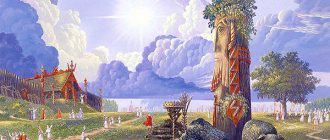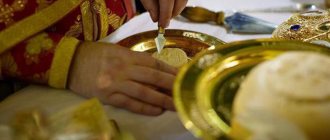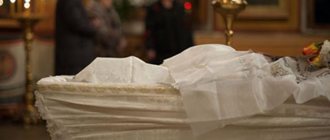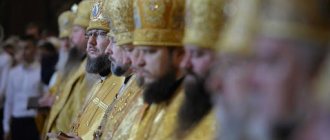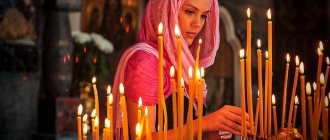Content:
- Important rituals after a funeral
- Visiting the grave on the second day after burial
- Funerals on days 9 and 40
- Famous signs
- What to do with food left over from a funeral
- What to do with the icon from the coffin
- What to do with the deceased's belongings
- Solving worldly affairs
Life does not stop after the burial of a person, and relatives often have the question of what to do after the funeral. It would seem that in such a situation it would be enough to hold a wake and remember the deceased in a church, but in reality, the death of a loved one radically changes people’s life circumstances and leaves many pressing matters that require close attention. This can be both the observance of religious traditions and the resolution of worldly issues relating to inheritance, installation of a monument, and reimbursement of burial expenses.
Special church dates for remembrance of the dead - parental Saturdays
Ecumenical Parental Saturdays - on these days special Ecumenical memorial services are served in churches.
These special Saturdays have temporary dates - and commemoration occurs every year on different dates.
Ecumenical Parental Saturdays in 2022:
- February 26, 2022
- Ecumenical Parents' Saturday - Meatless. - Parents' Saturdays of Great Lent: March 19, 2022
- Parents' Saturday of the 2nd week of Great Lent. - March 26, 2022
‒ Parents' Saturday of the 3rd week of Great Lent. - April 2, 2022
‒ Parents' Saturday of the 4th week of Great Lent. - Three days of remembrance have a constant date every year: February 6
- commemoration of the deceased who suffered for the faith of Christ during the time of persecution,
May 9
- commemoration of all those who died during the Great Patriotic War and all Russian soldiers,
June 22
- commemoration of all those killed during the Great Patriotic War and all the soldiers of Russia. - May 3, 2022
- Radonitsa - the ninth day after Easter, Tuesday of St. Thomas Week. - November 5, 2022
- Dimitrievskaya parent's Saturday. This date is always the day before the day of memory of Prince Dmitry of Thessaloniki - November 8. - October 8, 2022
– Intercession Parents’ Saturday. Saturday is the eve of the Intercession of the Virgin Mary, which is always celebrated on October 14th.
All commemoration dates involve attending memorial services in churches, reading funeral prayers, of course, and visiting the graves of your loved ones, relatives, friends and everyone who is dear to you.
Visiting the grave on the second day after burial
On the second day after burial, it is customary to come to the cemetery to visit the deceased in a new place. If possible, it is recommended to organize a breakfast after the funeral, which symbolizes the “awakening” of the deceased in another world. To do this, food is brought to the grave (boiled eggs, lean meat, sandwiches), which are stored at the burial site. You cannot eat these dishes yourself. They are distributed to those in need with requests to remember the deceased.
The tradition of a funeral breakfast goes back to the ancient Slavs. There is an opinion that after death the soul leaves the body and moves to the afterlife. On the second day she still remains on earth - in the place where the body rests. To awaken her and help her go to heaven, they bring food to the grave, which helps the soul to cleanse itself and move on to eternal life. Thanks to breakfast, you can not only help your soul, but also find moral peace. It is believed that if you do not visit the grave on the second day, the deceased may be offended that he was forgotten.
Origins of the tradition
Feasting at the grave is a pre-Christian, pagan tradition, dating back to such hoary antiquity that it is even difficult to pinpoint the time of its origin. Doctor of Historical Sciences, religious scholar A. Zubov believes that such a funeral custom has been going on almost since Paleolithic times. If we look at times closer to us, we can see that many peoples practice feasting at graves. The Slavs called them triznas.
It is difficult to say today exactly how the Slavic funeral feast took place, since not a single reliable description has been preserved, but we can say with complete confidence that the most important part of the feast was the food. When the funeral of a noble person took place, a sacrifice was made on a mound poured over his grave and ritual games were held (scientists A. Tseytlin, F. Fortunatov, O. Trubachev and others draw this conclusion based on the etymology of the word “trizna”, in a number of old Indo-European languages meaning “struggle, competition, reward” and even “three-year-old animal”). After this there was a feast. In The Tale of Bygone Years, Princess Olga, wanting to outwit the Drevlyans, asks them to prepare meads (intoxicating drinks) so that she can worthily celebrate a funeral feast for her husband at his grave.
The meaning of the feast at the grave is clear: since ancient times, a joint meal has served as a unifying event. Relatives and people close to each other eat together. It is no coincidence that bread and salt serve as a symbol of hospitality: by eating our food with us, a stranger becomes one of our own. Therefore, food next to the grave is a symbol of unity with the deceased, a sign that he still remains a member of the family, clan. This has a lot to do with the cult of ancestors, whom the Slavs (and not only the Slavs) revered as powerful intercessors, protectors of the living. You cannot offend your ancestors or bypass them at meals, otherwise they can easily turn from intercessors into malicious spirits.
Famous signs
There are many superstitious people who try to adhere to certain rules after a funeral:
- All mirrors in the house must be covered with thick fabric. It is believed that they must be hung within 40 days of death.
- You cannot make any repairs or rearrange furniture for 40 days. There is an opinion that at this time the soul of the deceased is still returning to his home, so any changes may upset her.
- In order not to disturb the soul that has not yet been laid to rest, it is not advisable to go to the cemetery every day.
- It is not recommended to clean on the day of burial and the day after it.
Why can't you eat in a cemetery?
When bringing food to the resting place of the deceased, you must understand that the food should be given to the poor or just acquaintances (who will eat the food). You can't eat them yourself. The Church strongly recommends giving up this habit in favor of reading prayer. After all, a person dies, not his soul. The latter especially needs support and salvation from living relatives.
People who eat in a cemetery do not commit a terrible sin. But in this way they do not help the soul of the deceased to get rid of the painful torments that befell it. You should not eat the food you brought. It is better to give it away as alms or feed it to animals. In this way, you will perform a good deed dedicated to the deceased person. Therefore, the commemoration will have meaning.
What to do with food left over from a funeral
Often after a funeral there is a lot of food left in the house, which relatives are forbidden to eat. What to do with such dishes? Leftovers after a funeral dinner should not be thrown away, because this can desecrate the memory of the deceased. The optimal solution is to take them to the cemetery and place them on the grave, where the food will be distributed to those in need. You can also independently distribute food to passers-by who met at the churchyard that day. It is better to take the baked goods to the temple or give them to people who beg under the walls of the church.
Why do the departed need physical food?
When taking food to the place of remembrance of the deceased, you must remember why they bring and leave food at the graves of the dead. They do not place food at the burial site so that the deceased will “eat” the dishes he loved during his lifetime. No. This is done in order to present food as alms to the poor after reading the prayer. Such people are closer to God, which means that their prayer will be heard earlier. Priests recommend giving food, not money, to poor people. They can use the money to buy alcohol. And they take the food and eat it with pleasure and joy.
Remember why food is left in the cemetery. This is done not to satisfy the physical needs of the deceased and so that his soul “eats,” but to make a donation in his honor. However, resorting to this method of alms is not recommended. Before placing and leaving the food you brought on the grave, remember the poor people who do not have food. It would be much more correct to give the food products into their hands. This way you will be sure that the person will eat, and, accordingly, the good deed has been completed.
What to do with the icon from the coffin
A pressing question for many people is what to do with the icon that was placed in the coffin. Orthodoxy allows it to be buried with the deceased, but if it is preserved after burial, there are several options for resolving this issue:
- leave it in the church where the funeral service took place, or take it to the church in honor of the saint depicted on the icon;
- leave in the church for 40 days, during which the soul ascends to heaven, and then take home;
- keep it at home (you can place it in the common iconostasis, and on memorial days, place it separately and light a candle).
Great holidays of the Russian Orthodox Church in 2022
April 24, 2022 - Easter.
Twelves:
- January 7, 2022 - Christmas.
- January 19, 2022 - Epiphany or Holy Epiphany.
- February 15, 2022 - Presentation of the Lord.
- April 7, 2022 ‒ Annunciation of the Blessed Virgin Mary.
- April 17, 2022 ‒ Palm Sunday or the Entry of the Lord into Jerusalem.
- June 2, 2022 - Ascension of the Lord.
- June 12, 2022 - Trinity Day or Pentecost.
- August 19, 2022 ‒ Transfiguration of the Lord.
- August 28, 2022 ‒ Dormition of the Blessed Virgin Mary.
- September 21, 2022 - Nativity of the Blessed Virgin Mary.
- September 27, 2022 ‒ Exaltation of the Holy Cross.
- December 4, 2022 ‒ Presentation of the Blessed Virgin Mary into the temple.
What to do with the deceased's belongings
Wearing or giving someone clothes that a person died in is dangerous. There may be traces of decomposition on it that are harmful to health. It is better to get rid of it immediately after burial. All other belongings of the deceased can be distributed to family, friends or those in need. There are several opinions on when to give away clothes. Some believe that it is better to give things away within 40 days after death, so that people can remember the deceased. Others believe that the energy of the deceased remains on the clothes for the first 40 days, so it is better to distribute them after this period.
If desired, relatives can keep several items for themselves. It is recommended to store them not in an open place, but in some kind of closet. It is believed that they should not lie in a room where people sleep, otherwise the deceased will appear in a dream. In addition, in the Orthodox religion it is not recommended to wear the clothes of the deceased to those relatives who lived in the same house with him.
What to bring and in what quantity
There are no special instructions regarding what should be brought to the funeral table. The only product that is strictly not recommended to carry is meat.
To avoid mistakes, you can first ask church ministers for advice. Most often they bring to funeral tables:
- cereals;
- sugar;
- flour;
- vegetable oil;
- bread, rolls;
- vegetables and fruits;
- candies, cookies, other sweets.
As for the number of products, it depends on the capabilities of each person. The clergy say that any gift that a person can tear away from himself and his budget is important. In any case, this will be a great help for those in need. The Bible says that the widow's contribution was small compared to others. However, the Lord accepted this contribution and placed it above others, since the woman gave the last thing she had.
Found a violation? Report content
Solving worldly affairs
Already on the second day after the funeral, relatives expect many questions that relate to worldly affairs. In particular:
- If the deceased suffered from an infectious disease, the home should be disinfected. The same rule applies to decedents who died from other causes but remained in the house for more than 6 hours after death.
- After the burial, it is worth taking care of reimbursement of funeral expenses. All Russian citizens are entitled to compensation, and some people (for example, military families) can count on additional benefits and payments. The benefit is provided to the person responsible for the burial. You should contact him no later than six months from the moment of death.
- If the deceased had loans, payments on them should be stopped. According to the law, the bank cannot charge interest on loans for 6 months after the death. Also, a financial institution does not have the right to demand monthly contributions from relatives, but for this you need to submit a corresponding application to the bank. If you have a loan insurance policy, you can apply for insurance.
- In the event of death in an accident, relatives can receive insurance under MTPL. Its maximum amount is 500 thousand rubles. Payment is made 20 working days after submitting the application.
- Within 6 months, relatives must begin paperwork to enter into inheritance. To do this, you need to contact a notary and submit a statement of intent to accept the property of the deceased. An inheritance can be obtained by will or by right of kinship.
- A year after the funeral, you need to start installing a monument on the grave. The choice of burial structure is carried out according to the planned budget and preferences of relatives.
If you don’t know what to do after the funeral the next day, contact the Honest Agent funeral home for help. Our employees are perfectly familiar with the signs, customs, and peculiarities of burial in different religions and are ready to provide detailed advice regarding compliance with accepted traditions. We can also take care of all the arrangements for organizing the funeral. Our company has many years of experience in preparing for burial and can guarantee a dignified funeral ritual according to the wishes of relatives.
Tell your friends:
“Question-answer” section
Why can’t you go to the cemetery on Easter and Palm Sunday?
Expert opinion
Father Pavel
Clergyman
Christian holidays (Easter, Palm Sunday) evoke a blissful, sublime state and joy. For this reason, it is not customary to visit the churchyard on days of mourning. Those who have recently lost loved ones or are going to the graveyard to remember a long-dead person should postpone their visit to the grave. But, according to the canons of Orthodoxy, there is no strict prohibition. In the tradition of the population of some regions and countries, there is such an action as visiting a churchyard on Palm Sunday; people carry palm branches to the graves of the dead.
Is it possible to go to the grave every day?
Expert opinion
Lavrova Tatyana
Rehabilitation specialist, psychologist
The answer to the question of how often you can visit a cemetery is ambiguous and depends on many factors. First of all, the degree of prescription of the funeral is noted. If a loved one has recently died, it is acceptable to visit the cemetery for a few days. But this period should not last long. Strong grief for the deceased is not welcomed by the church. It should be remembered that the soul rushes into eternity, where other souls of the righteous (members of the same family) will also end up, which means they will soon meet. In other cases, you need to visit the graveyard on memorial days.
How often do Muslims visit graves?
Expert opinion
Remontnikov Vladimir Petrovich
Religious scholar, historian
In Islam, there are memorial days for visiting a cemetery, but usually at this time, loved ones gather at one table and remember the deceased Muslim. Believers of this religion have no prohibition on visiting the graves of the deceased. This can be done any day. Moreover, visits are allowed to women and men. For comparison, men come to the cemetery during funerals. Pregnant women should not visit the grave of a loved one. But you can go later - on one of the memorial days, if you feel normal.
When do they go to the cemetery after a funeral at an Orthodox grave, at what time of day?
Expert opinion
Father Pavel
Clergyman
Funerals are held on the third day after a person's death. The next visit is acceptable on the 4th day. It is called offering “breakfast” to the deceased. This is not necessary, but relatives need additional time to spend with the deceased, albeit in a different form. This is also an occasion to talk to the soul of the deceased. Next time it is better to visit the grave when the 9th day comes from the date of death. The time of day is always the same - the first half of the day. In the evening it is better not to walk among the dead, as this could disturb them. The recommended time for visiting the churchyard is before 14:00, but this is not a hard and fast rule, since the gates of the churchyard remain open until late.
How often can you go to a cemetery and what does “often” mean?
Expert opinion
Lavrova Tatyana
Rehabilitation specialist, psychologist
The soul experiences pain when it sees the suffering of loved ones. This prevents her from flying away and disrupts the usual course of things. It is better to go to the funeral, and then visit the deceased on memorial days. Frequent visits are not advisable. They also harm loved ones, making it more difficult to renounce the topic of death. Everyone has their own concept of “frequent visits”. But the church calls it this for visits that take place on any days except general and private memorial days. If parents are grieving for their children, or a wife for her husband, you can additionally visit the cemetery on a day not intended for this, but you should not develop such a habit. Traditionally, the secular concept of “often” involves visiting the graveyard weekly or monthly.
Graves
Is it possible to go to the cemetery on Sunday?
Expert opinion
Father Pavel
Clergyman
Usually they go to the grave of the deceased on Saturdays, and then they celebrate memorial days. Great church holidays often fall on Sunday, which makes it impossible to visit the deceased. If the planned visit coincides with an important religious day, it is postponed to the next one. To avoid such a problem, you need to find out in advance whether you can visit the cemetery on Sunday.
Is it possible to go to the cemetery on Wednesday according to Christian customs?
Expert opinion
Father Pavel
Clergyman
The clergy do not condemn people who sometimes adhere to Old Slavonic customs (preserved from pagan times), but do not welcome such behavior. Many of them came to Christianity from non-believers precisely because of the established habit of performing them. But the meaning has long been changed, the traditions have acquired a divine origin. However, some of the pagan customs are denied by the Orthodox Church, such as the ban on visiting the churchyard on Wednesdays. Christians are allowed to go to the grave of the deceased on any convenient day, unless it falls on a great religious holiday.
Visiting a grave with flowers
When can you go to a cemetery, and when is it absolutely forbidden, what could this be connected with?
Expert opinion
Lavrova Tatyana
Rehabilitation specialist, psychologist
It is believed that pregnant women, as well as during menstruation, should not visit the churchyard. This is a misconception: you can visit the dead when the need arises. When planning, it is even possible to consider numbers for this purpose when critical days arrive. Night time is prohibited - the graveyard must be empty. Also, you should not come to the grave of the deceased when great religious holidays occur.
Is it possible to go to the cemetery on Monday?
Expert opinion
Father Pavel
Clergyman
There is no ban on visiting the cemetery after the weekend. The beginning of the week is not suitable for everyone, since people usually go to work, but if the need arises, you can honor the memory of the deceased with a visit. Monday, like any other weekday (except Friday), is quite suitable for this.
Is it possible to go to the cemetery on Thursday? What do esotericists say?
Expert opinion
Lantsova Kristina
Esotericist
The view of esotericists: the negative energy of the churchyard puts pressure on the living, interaction with it can lead to illness and sometimes death. It is not recommended to visit this place too often. You shouldn’t come at all at night, because the living can unwittingly disturb the dead, which will cause unpleasant and even dangerous consequences.
Elderly woman in a cemetery

